- Home
- David Sedaris
Squirrel Seeks Chipmunk Page 5
Squirrel Seeks Chipmunk Read online
Page 5
“Don’t you have four legs?” the pig asked.
The cow loosed something between a moan and a sigh. “All right, just because you have a curly tail,” she said.
The pig tried looking behind him, but all he could see were his sides. “Is it curly curly?” he asked the rooster. “Or curly kinky?”
“The point is that I’m tired of being pushed around,” the cow said. “I think a lot of us are.”
This was her all over, so rather than spending the next week listening to her complain, it was decided that the cow would give to the turkey and that everyone else would keep their names a secret.
There were, of course, no shops in the barnyard, which was a shame, as all of the animals had money, coins mainly, dropped by the farmer and his plump, moody children as they went about their chores. The cow once had close to three dollars and gave it to a calf the family was taking into town. “I want you to buy me a knapsack,” she’d told him. “Just like the one the farmer’s daughter has, only bigger and blue instead of green. Can you remember that?”
The calf had tucked the money into his cheek before being led out of the barn. “And wouldn’t you know it,” the cow later complained, “isn’t it just my luck that he never came back?”
She’d spent the first few days of his absence in a constant, almost giddy state of anticipation. Watching the barn door, listening for the sound of the truck, waiting for that knapsack-something that would belong only to her.
When it no longer made sense to hope, she turned to self-pity, then rage. The calf had taken advantage of her, had spent her precious money on a bus ticket and boarded thinking, So long, sucker.
It was a consolation, then, to overhear the farmer talking to his wife and learn that “taking an animal into town” was a euphemism for hitting him in the head with an electric hammer. So long, sucker.
Milking put the cow in close proximity to humans, much closer than any of the other animals, and she learned a lot by keeping her ears open: who was dating whom, how much it cost to fill a gas tank, any number of useful little tidbits-the menu for Christmas dinner, for instance. The family had spent Thanksgiving visiting the farmer’s mother in her retirement home and had eaten what tasted like potato chips soaked in chicken fat. Now they were going to make up for it “big-time,” the farmer’s wife said, “and with all the trimmings.”
The turkey didn’t know that he would be killed on Christmas Eve; no one knew except the cow. That’s why she’d specifically chosen his name for the secret Santa program-it got her off the hook and made tolerable his constant, fidgety enthusiasm.
“You’ll never in a million years guess what I got you,” she said to him a day after the names were drawn.
“Is it a bath mat?” the turkey asked. He’d seen one hanging on the farmer’s clothesline and was promptly, senselessly, taken by it. “It’s a towel for the floor!” he kept telling everyone. “I mean, really, isn’t that just the greatest idea you’ve ever heard in your life?”
“Oh, this is a lot better than a bath mat,” the cow said, beaming as the turkey sputtered, “No way!” and “What could possibly be better than a bath mat?”
“You’ll see come Christmas morning,” she told him.
Most of the animals were giving food as their secret Santa gift. No one came out and actually said it, but the cow had noticed them setting a little aside, not just scraps but the best parts-the horse her oats, the pig his thick crusts of bread. Even the rooster, who was the biggest glutton of all, had managed to sacrifice and had stockpiled a fistful of grain behind an empty gas can in the far corner of the barn. He and the others were surely hungry, yet none of them complained about it. And this bothered the cow more than anything. Which of you is sacrificing for me? she wondered, her mouth watering at the thought of a treat. She looked at the pig, who sat smiling in his pen, and then at the turkey, who’d hung a sprig of mistletoe from the end of his wattle and was waltzing from one animal to the next, saying, “Any takers?” Even to other guys.
Oh, how his cheerfulness grated on her. Waiting for Christmas Eve was murder, but wait the cow did, and when the time was right-just shortly after breakfast-she sidled up beside him. “You do know they’ll be cutting your head off, don’t you?” she whispered.
The turkey offered his strange half smile, the one that said both “You’re kidding” and “Please tell me you’re kidding.”
“If it’s not the farmer, it’ll be one of his children,” the cow confided. “The middle one, probably, the boy with the earring. There were some jokes about doing it with a chain saw, but if I know them they’ll stick to the ax. It’s more traditional, and we all know how they love a tradition.”
The turkey laughed, deciding it was a joke, but then he saw the pleasure in the cow’s face and knew that she was telling the truth.
“How long have you known?” he asked.
“A few weeks,” the cow told him. “I meant to tell you earlier, but with all the excitement, I guess I forgot.”
“Kill me and eat me?”
The cow nodded.
The turkey pulled the mistletoe from the end of his wattle. “Well, golly,” he said. “Don’t I feel stupid.”
…
Not wanting to spoil anyone’s Christmas, the turkey announced that he would be spending the holiday with relatives. “The wild side of the family,” he said. “Just flew in last night from Kentucky.” Noon arrived, and when the farmer and his middle son appeared in the barnyard, the turkey went to them without a fuss, saying, “So long everyone” and “See you in a few days.”
They all waved good-bye except for the cow, who lowered her head toward her empty trough. She was just thinking that a little extra food might be nice, when something horrible occurred to her. The rooster was standing in the doorway, and she almost trampled him on her way outside, shouting, “Wait! Come back. Whose name did you draw?”
“Say what?” the turkey said.
“I said, whose name did you get? Who’s supposed to receive your secret Santa present?”
The turkey answered a thin, “You’ll see,” his voice a little song that hung in the air long after he’d disappeared.
The Vigilant Rabbit
A white-tailed doe was discovered one morning disemboweled on the banks of the stream, and the residents of the forest went crazy with fear-“freaked out” was how the sparrow put it. A few days later, a skunk was found, no more than a gnawed-upon skull attached to a short leash of spine. Personality-wise, he’d been no great shakes. Neither was he particularly good-looking, but still! Then a squirrel disappeared, and it was decided that something had to be done. A meeting was convened in the clearing near the big oak, and the hawk, who often flew great distances in search of food, proposed that they build a gate. “I’ve seen one where the humans live, and it seems to work fairly well.”
“Work how?” asked a muskrat.
The hawk explained that once the gate was erected, anyone entering the forest would have to stop and identify himself. “It keeps out the riffraff,” he said, adding that when bad things happened, that was usually who was responsible-riffraff.
For the second time that day, the muskrat raised his hand. “And what if this riffraff can’t be stopped?”
“Then you sound an alarm,” the hawk suggested. “It could be anything, really, just so long as it’s loud.”
The building of the gate was left to the beaver, who had a slight problem with the hinges but eventually got them right. Just to the side of them he hung a gong fashioned from an old NO TRESPASSING sign. “I figured I could hit it with my tail,” he said, and he gave it a whack for good measure.
When the noise had stopped echoing off the surrounding hills, the rabbit stepped forward. “Who elected you to man the gate?” he asked, adding that anyone could hit a sheet of rusted metal, even someone without an oversize tail. At that he picked up a heavy stick and went at it, creating a racket as loud as the beaver’s. “I’ve also got the better hearing,” he boaste
d. “I’m slimmer, I’m faster, and I’m more safety conscious, vigilant, you might say.”
All eyes turned to the beaver, who said simply, “Whatever,” and waddled back to his lodge.
On the rabbit’s first morning as chief of security, he stopped an approaching snake, who looked up at him and laughed until he cried.
“Something funny?” asked the rabbit.
The snake used his tail to wipe a tear from his face. “You idiots,” he said. “What good is a gate without a wall?”
“What good is a huh?”
“It doesn’t make any sense,” continued the snake. “If an animal doesn’t want to enter here, what’s to stop him from moving down a few dozen yards and crawling in beside the fallen pine?”
“What’s to stop him?” asked the rabbit, and he picked up his heavy stick and bashed the snake’s head in. Then he kicked some dirt over the body and wrote NO LAUGHING on the NO TRESPASSING sign.
A short while later a magpie stopped by and pecked at the bits of brain left scattered on the ground in front of the gate. “Not to nitpick,” he said between mouthfuls, “but what’s to prevent someone from entering by air? You and your friends initiate a no-fly zone?”
“What’s to keep you from flying in?” asked the rabbit, and once again he brought down his heavy stick. Then he dug up the snake and hung both it and the dead magpie from the top of his gate. There they could act as visual warnings, proof that he was a force to be reckoned with. When that was done, he added to his sign, which now read, NO TRESPASSING. NO LAUGHING. AND NO STUPID QUESTIONS EITHER. THIS MEANS YOU.
It was a hot, windless day, and within an hour blowflies arrived and settled on the faces of the two dead animals. Their buzzing attracted a frog, who jumped over from the nearby stream, flicked out his tongue, and dined upon them until he was full. Only then did he read the sign and turn to address the rabbit. “Seeing as you don’t want jokes or questions, I guess I’ll phrase this as a comment,” he said. “In order to enter through your gate, I’ll have to stop and go through your tiresome rigmarole. That kind of BS doesn’t interest me much, so instead I’m going to return to my stream and swim into your third-rate, beetle-infested forest.”
He turned to leave, and the rabbit, who was nothing if not quick, reached for his heavy stick. Then he hung the frog upon his gate and added NO CURSING to his NO TRESPASSING sign.
It wasn’t long before an otter came along and went for the crushed frog. Then a badger stopped by, attracted by the smell of the dead otter. As the bodies were heaped upon the gate, it began to tilt. The rabbit propped it up with a fallen branch and then turned his attention to the sign. NO DIRTY LOOKS, he wrote. NO QUESTIONING MY INTEGRITY. NO INSULTING REMARKS ABOUT MY EARS OR MY TEETH. He was just wondering how to spell “insolence” when a shadow fell, and he looked up to see a magnificent white unicorn. His silky mane curled about his neck in waves the color of buttercups. Equally brilliant was his horn, which looked to be made of gold. At his approach, the rabbit put down his pencil. “State your name and your business.”
“I’m a unicorn,” said the unicorn, “and I come to bring joy to all the forest creatures.”
“Not with that horn you don’t,” said the rabbit.
“I beg your pardon?”
“I said, lose the weapon.”
“The horn is what makes me who I am!”
“Which is unwelcome,” said the rabbit. “Now do as I say or beat it.”
“But happiness follows wherever I go!” the unicorn protested. “I can make a rainbow just by flicking my tail.”
The rabbit reached for his stick.
“If you won’t let me through the gate, I’ll just jump over it,” said the unicorn. And because he was taller than the rabbit and much more powerful, he did just that. “Sorry,” he said as he headed into the forest, “but you didn’t leave me any choice.”
“We’ll see about that,” muttered the rabbit, and he spat onto the blood-soaked ground.
The unicorn spent the late afternoon making rainbows for all the woodland creatures. Then he caused the wildflowers to bloom and conjured up some berries for a hungry box turtle. As the sun set over the treetops, he settled upon a bed of fragrant moss and fell into a deep sleep.
The following morning, the songbirds woke him. The unicorn yawned and was just about to stand when he noticed the pile of golden shavings scattered across the moss. Then he felt his forehead and galloped to the gate piled high with rotting carcasses. “Who chewed off my horn?” he wailed.
The rabbit answered calmly that rules were rules. “If I let you trot around with a weapon on your head, I’d have to let everyone do it.”
“But it had magic powers!”
“I said, scram,” said the rabbit.
The unicorn, just a common everyday horse now, slunk off toward a field of tall grasses. The rabbit watched him go and then turned back to his sign. “Magic powers indeed,” he muttered. “I didn’t taste anything special.” Again he spat, only this time, a diamond came out and landed on the ground beside him. That’s what he was staring at when the wolves arrived.
The Judicious Brown Chicken
It was hot that afternoon, so after the chicken and her sister had walked the yard a few times, they wandered into the henhouse for a little shade. Had it been crowded they probably wouldn’t have said much, but there was no one around, and so the two spoke intimately, the way they had when they were young. “I don’t know if it’s normal or what,” the sister said. “But sometimes… and this is just between the two of us, okay?”
The chicken nodded.
“Sometimes, when I’m with the rooster, I wonder what it would be like if he, you know, wasn’t a rooster.”
“You mean, like, if he was a duck or a goose?” The thought was ridiculous, and the chicken had to bite the inside of her beak to keep a straight face. “Or how about a turkey?” At this she lost her composure and whooped until her eyes teared. “I’m sorry,” she said. “I’m sorry. Go on.”
“Never mind,” her sister said. “It wasn’t important.”
“Oh, don’t be like that,” the chicken scolded. “Come on, now. So if he’s not a rooster, what is he?”
The sister took a deep breath and let it out slowly. “Well, like, maybe if he was, for instance, more like me?”
“Brown?” the chicken said, and in the silence that followed she grasped what her sister had been aiming at. “You don’t mean…”
“It’s just a thought,” her sister said.
“Just a thought?”
“Something that’s passed through my mind a couple of times.”
“A couple of times?” This was what the chicken did when presented with shocking or unpleasant news. If informed, for example, of an outbreak of lice, she’d look at the speaker, saying, “An outbreak of lice?” as if the transformation from statement to question might somehow confuse the situation into reversing itself.
“I shouldn’t have said anything,” her sister said.
“Shouldn’t have said anything?”
As they were talking, the farmer’s wife walked in. She was a plump woman but quick, and before the sisters had time to run, she grabbed them by the feet and hung them upside down, one in each hand. The chicken had never seen the world from this angle and wasn’t sure she liked it: an open doorway three feet off the ground. Trees hanging senselessly from a brilliant green sky. Her vision grew hazy, and just as she thought she might pass out, the farmer’s wife released her grip and the chicken fell on her head into the straw. Her sister, meanwhile, with one clean jerk, had her neck wrung.
“At least it happened quickly,” the gray pullet said, and the chicken agreed that it could have been worse.
“You’re just lucky the woman chose your sister instead of you,” the pullet continued, and though the chicken concurred, she knew that luck had nothing to do with it. Her sister had been killed because she deserved it-there was no other explanation. Decent creatures lived until they couldn’t stand i
t anymore, and then they were ushered to a kind of paradise where they were adorned with jewels and tended to by servants hoisting platters full of grain.
Devious and perverse creatures, on the other hand, suffered untimely deaths and were sent to a reverse paradise where they were the servants, and instead of jewels they were adorned with flaming-hot coals. Her sister was there now, and all because she had entertained unnatural thoughts, which were as bad as unnatural actions in certain circumstances. “I’m sorry it had to happen,” the chicken told the pullet, “but at least I learned something from it.”
At dawn the following morning, the rooster made his rounds. He was a disagreeable character, someone to be endured rather than looked forward to, but to not accept him or to do so with less than a full heart was, the chicken now understood, a first-class ticket to hell. He approached her nest and had just taken his position when she turned to address him. “I want you to know,” she whispered, “that I really love you.”
“Tough titty,” he said.
“No,” she went on, “I mean it. Some of the others, they might put up with you or whatnot, but I honestly treasure our time together, and I wouldn’t trade you for anyone.”
He told her that unless she was willing to talk dirty she should just keep her trap shut, and when she continued he jerked his head forward and pecked out her left eye.
“It was an accident,” she told the others. “He gets excited and, well, you know, these things happen.” Inwardly, though, she was devastated. Had the rooster chipped her beak, all right, no hard feelings, but her eyes were her best feature, and now she had only one of them. The other was just a dank hole, the rim crusted with blood and mucus.
“Cyclops,” her friends started calling her. As in, “Hey, Cyclops, you might want to keep an eye out for that rooster.” The only one who didn’t tease her was an underweight guinea hen whom the chicken had seen around but never really spoken to. “I don’t think it looks that bad, actually,” she said. “I mean, it’s part of what makes you you, right?”

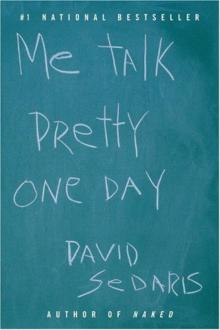 Me Talk Pretty One Day
Me Talk Pretty One Day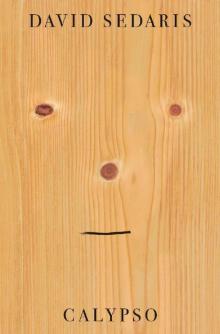 Calypso
Calypso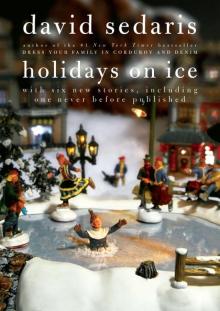 Holidays on Ice
Holidays on Ice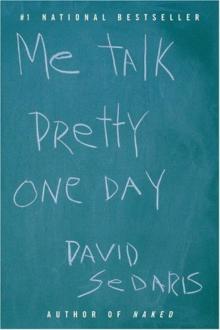 Mi vida en rose
Mi vida en rose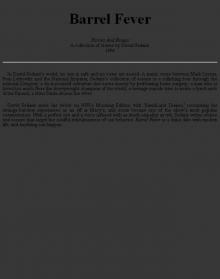 1994 - Barrel Fever
1994 - Barrel Fever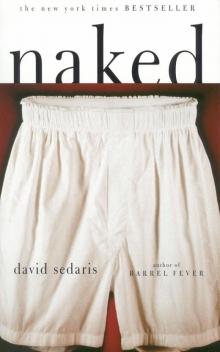 Naked
Naked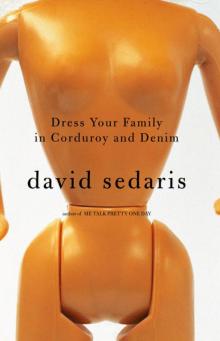 Dress Your Family in Corduroy and Denim
Dress Your Family in Corduroy and Denim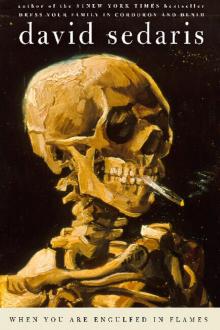 When You Are Engulfed in Flames
When You Are Engulfed in Flames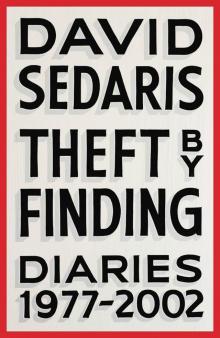 Theft by Finding: Diaries 1977-2002
Theft by Finding: Diaries 1977-2002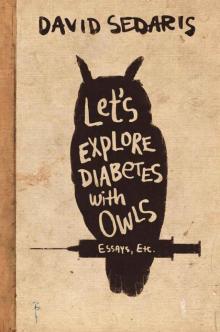 Let's Explore Diabetes With Owls
Let's Explore Diabetes With Owls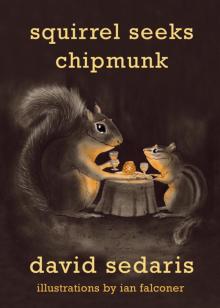 Squirrel Seeks Chipmunk: A Modest Bestiary
Squirrel Seeks Chipmunk: A Modest Bestiary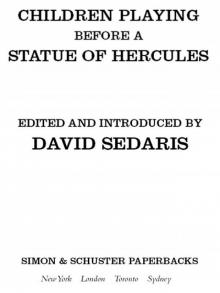 Children Playing Before a Statue of Hercules
Children Playing Before a Statue of Hercules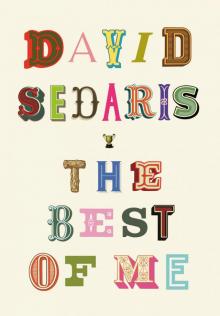 The Best of Me
The Best of Me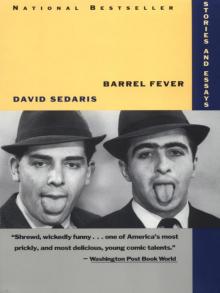 Barrel Fever
Barrel Fever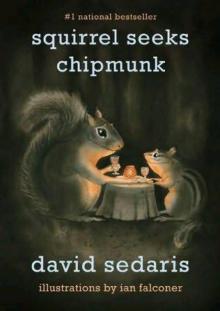 Squirrel Seeks Chipmunk
Squirrel Seeks Chipmunk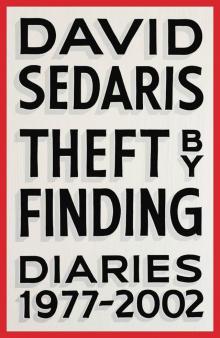 Theft by Finding
Theft by Finding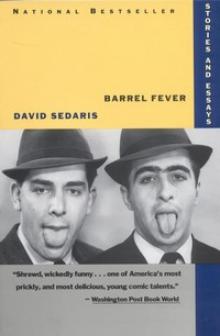 Barrel Fever and Other Stories
Barrel Fever and Other Stories